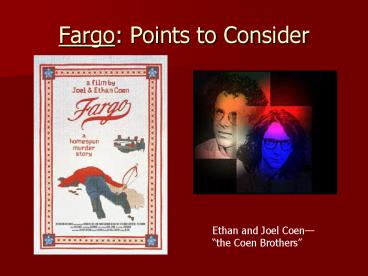Fargo: Points to Consider - PowerPoint PPT Presentation
1 / 14
Title:
Fargo: Points to Consider
Description:
Out of respect for the dead, the rest has been told exactly as it occurred. ... Academy Awards. Frances McDormand won an Oscar for her role as Police Chief Gunderson. ... – PowerPoint PPT presentation
Number of Views:259
Avg rating:3.0/5.0
Title: Fargo: Points to Consider
1
Fargo Points to Consider
Ethan and Joel Coen the Coen Brothers
2
True Stories
This is a True Story The events depicted in this
film took place in Minnesota in 1987. At the
request of the survivors, the names have been
changed. Out of respect for the dead, the rest
has been told exactly as it occurred.
3
Classicism vs Formalism
Classicism or Hollywood Realism the normative
style of Hollywood studio film production and,
therefore, the dominant style of filmmaking
internationally, with emphasis on realistic
representation of characters in action over
sequential time, all to achieve the willing
suspension of disbelief by the audience.
4
Classical Cutting
- An unobtrusive editing style which does not draw
attention to itself but rather invites the viewer
to remained focused on characters in action. - Classical cutting is used during several
sequences during this film - Car chase alternating from Gaears profile and
upper torso in a tightly framed medium shot to
scenes of the road ahead (POV shots)
5
Is Fargo a Classic Hollywood film?
We need to be careful with this perception. This
film does carry formalist traditions with
it Formalism a critical approach to
filmmaking which stresses form over content
premised on the assumption that meaning has to do
with how the content is presented rather than the
content in-and-of itself (e.g., Louis Bunuel's Un
Chien Andalou (1928) and David Linch's Blue
Velvet(1986))
6
Fargo and Realism
- Fargo attempts to disarm the viewer with a
realistic portrayal of the murders and
plotline. - The opening text is the first instance of this
attempt to disarm. - What makes this film realistic?
- portrayal of characters
- scene locations
- banal or mundane conversations between characters
7
Fargo and Genre
- Fargo continues to disarm us by drawing on
several established conventions and genres that
may be familiar to us - Classical cutting (as in the car chase scene)
- True Crime genre (or even COPS - the final
scene with Jerry) - Comedy genre (funny lookin) and
tongue-in-cheek delivery - Horror genre (after all, there are murders)
- The Post-Modern colour noir (from the film noir
tradition)
8
The Post-Modern Fargo
- What do we mean by Post-Modern?
- For our purposes with Fargo, Post-Modernism
points to the self-conscious way the film uses
all of these elements, conventions and genres. - Fargo is a parody of these styles and genres,
and as a parody it uses exaggeration and
gratuitous violence to get its point across. - use of regional accents
- selection of character names (Lundegaard,
Gustafson, Gunderson, Proudfoot) - careful ordering of transitions and editing
9
Editing and Parody
- Consider the following as it applies to Parody
and genre - Cutting the axe scene at the cut point
- Norm and Marge chewing at the smorgasbord
cutting to the face of Stan Grossman chewing - Carl banging on the TV (Plug me into the Ozone
baby!) and cutting to the mating habits of the
beetle on the Gundersons television - The Kidnappers in bed with the prostitutes
cutting to the Gundersons in bed at home
10
Fargo and Formalism
- Because of its use of parody, and its clever use
of editing, mise-en-scene (think of Marges first
interview with Jerry) and even sparing use of
music (opening and closing sequence), Fargo
establishes itself with Formalism - The self-conscious Post-modern style draws
attention to itself. - Hollywood Classicism insists on an invisible
style and the voluntary suspension of disbelief
11
What is Fargo trying to say to us? (What are the
Themes?)
- An indictment of the American gun mentality.
- Points out the existential failure of characters
who lie to others as well as themselves about the
repercussion of their actions (ie. car salesmen),
and those who value money above all else (And
its a beautiful day). - Supports the notion that there is real strength
in women (even pregnant women) and that men and
women can support role reversals (film noir)
note the use of the split screen during the
breakfast scene at the Gundersons.
12
Fargo and Theme
- Violence and evil cannot be discovered as
quickly as promised in True Crime or mystery
genres it exists beneath the surface of banality
and rote pleasantries - similarities between Marge and Gaear
(emotionless) - Jerry and his breakdowns (parking lot scene,
final sequence) - Paul Bunyan statue (low angle, high contrast
lighting) - Mike Yanagita scene (disturbing at best)
13
Fargo and Motif
- Motif
- the systematic repetition of a theme, object or
technique - television
- insects
- eating and appetite
- mythological characters (Bunyan, Marlboro Man)
14
Academy Awards
- Frances McDormand won an Oscar for her role as
Police Chief Gunderson. - Her acceptance speech focused on Fargo as
offering a decent role for women, a role that
emphasizes womens resourcefulness and inner
strength over the typical subordinate, sexual
images that the majority of films pander.































